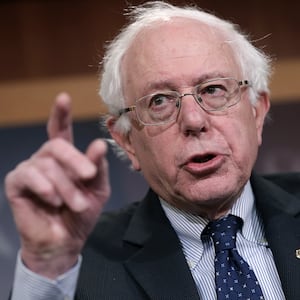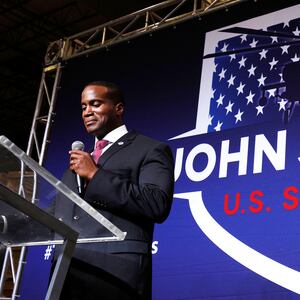Sen. Bernie Sanders (I-VT) is perhaps the nation’s most outspoken critic of undisclosed money in the American political process. But as the 2020 campaign kicked into gear, some of the Senator’s former senior aides quietly constructed a formidable political apparatus financed by the type of untraceable “dark money” that their ex-boss decried.
America’s Progressive Promise, a new super PAC run by Jeff Weaver, Sanders’ former campaign manager, received two donations totalling $4.75 million in the third quarter of the year from a prominent progressive nonprofit known for masking the identity of high-dollar political donors. That represented the vast majority of money that the group has raised to date.
But Weaver’s organization spent little of that money on direct politicking. Within days of each of the two contributions, it passed along nearly all of the cash it received from the dark money group, the Sixteen Thirty Fund, to another super PAC also founded by a former Sanders aide, Chuck Rocha, with which America’s Progressive Promise has partnered on voter outreach and advocacy in the Latino community. Rocha’s group, Nuestro PAC, took that money and immediately used it to finance seven-figure advertising and direct mail campaigns attacking President Donald Trump and boosting his Democratic challenger, Joe Biden.
The series of transactions show how millions in untraceable cash can be funneled on to the airwaves ahead of a tight electoral contest. But what stands out in this case is that it was all done by way of organizations run by people ostensibly committed to rooting out undisclosed political money in politics.
This Bernie-world infrastructure was built amid an election cycle in which Democrats have openly capitalized on lax campaign finance regulations that they routinely decry. Operatives working in this space generally plead that Democrats cannot “unilaterally disarm” in the political money race. Even Sanders himself has benefitted from the same “dark money” political spending he routinely decries.
“While others are free to disagree, we believed when it was formed and still do that this vehicle is necessary to defeat Donald Trump and Senate Republicans,” Weaver told The Daily Beast in an emailed statement. “Unfortunately, in the current campaign finance environment every legally available tool, including independent expenditure vehicles, have to be deployed.”
Rocha did not respond to requests for comment on the financial support for Nuestro PAC. But when he founded the group in the spring, he was insistent that it would disclose the true sources of the funds it planned to use to activate the Hispanic vote on Biden’s behalf.
“I didn’t start a c-4 because they do not disclose their donors and I hate these dark money groups!” Rocha wrote on Twitter, referring to the 501(c)(4) designation for tax-exempt advocacy organizations. “My pac will be powered by people, not corporations and will fully disclose each donor on fcc website monthly as the law requires.”
In response to another Twitter user who noted past Democratic efforts to circumvent super PAC disclosure requirements, Rocha wrote that such groups, “funnel money from their C-4 (non disclosed donors) into the Super pac. We are NOT excepting [sic] any C-4 dark money into our pac!”
As far as we know, that remains true. But while Nuestro PAC has not directly accepted 501(c)(4) money, such money has found its way into the group’s bank account—and appears to have single-handedly financed its first major foray into the presidential race.
The origins of the Nuestro PAC ad buy appear to be the Sixteen Thirty Fund. A dark money group, the Sixteen Thirty Fund is structured in a way that shrouds significant information about the millions of dollars that it’s reported giving to Democratic political groups this cycle. Scores of subsidiary organizations operate under the Sixteen Thirty umbrella. When those groups make political contributions, the transaction generally shows up as a donation from Sixteen Thirty, not from the subsidiary that’s actually responsible for the contribution. In addition to hiding the actual sources of money, that makes it nearly impossible to discern from public records whether the donor is Sixteen Thirty itself or one the groups for which it acts as a “fiscal sponsor;” and if the latter, which one.
It is, in short, a layer of opacity added to an already opaque transaction.
From public information, however, this is what is known.
America’s Progressive Promise recently partnered with Nuestro PAC, aiming to leverage the latter organization “to educate, mobilize and turn out Latinos in targeted states in the 2020 General Election,” according to the America’s Progressive Promise PAC website. The subsequent flows of money between the two groups appear to have been part of that partnership.
On July 9, 2020, the Sixteen Thirty Fund donated $2.25 million to Weaver’s America’s Progressive Promise PAC. Hours after that donation, America’s Progressive Promise made a contribution of its own, passing along $1.95 million to Rocha’s Nuestro PAC, which had previously raised just $6,700 since its founding in April. The next day, Nuestro PAC made its first independent expenditures of the cycle: $1,951,035 to produce and place television and digital ads targeting Trump and backing Biden.
Two months later, on September 11, America’s Progressive Promise received another $2.5 million from Sixteen Thirty. Three days after that, it wrote a check for that precise sum to Nuestro PAC, and once again, the latter quickly used it to finance more independent expenditures focused on the presidential race. On September 18, Nuestro PAC reported paying Rocha’s firm, Solidarity Strategies, more than $2.1 million for a direct mail campaign opposing Trump and supporting Biden. A week later, Nuestro PAC dropped another $410,000 on digital and broadcast ads in the presidential race. (The second series of transactions was not initially disclosed in America’s Progressive Promise’s quarterly FEC filing on Wednesday. The group amended its filing a few hours later to note the transfers.)
The $4.75 million that Sixteen Thirty provided to America’s Progressive Promise accounted for 92 percent of the money the group raised in the third quarter. And the more than $4.5 million that America’s Progressive Promise passed along to Nuestro PAC accounted for the vast majority of the roughly $4.9 million that group has dropped on the presidential race, the only election on which it’s reported spending, since its inception.







